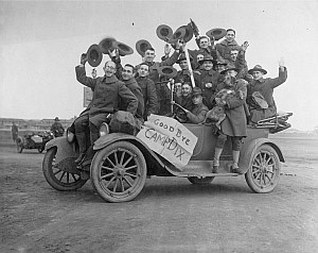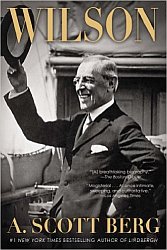History -- World War I and the 1920s
* Native Americans * Exploration and Settlement * British colony
* Royal governance * Path to Revolution * Revolutionary War
* Industrialization * Civil War * Post-War Economy & Reform
* Woodrow Wilson as Governor * World War I & 1920s * Great Depression
* World War II * Post-War Development * 1960s & Richard Hughes
* 1970s & Income tax * 1990s-Whitman & Florio * 9/11 & McGreevey Administration
* Codey & Corzine * Chris Christie
* Phil Murphy
* Royal governance * Path to Revolution * Revolutionary War
* Industrialization * Civil War * Post-War Economy & Reform
* Woodrow Wilson as Governor * World War I & 1920s * Great Depression
* World War II * Post-War Development * 1960s & Richard Hughes
* 1970s & Income tax * 1990s-Whitman & Florio * 9/11 & McGreevey Administration
* Codey & Corzine * Chris Christie
* Phil Murphy
|
* Home
* History * Population * Government * Politics * Lobbyists * Taxes * State Symbols * Biographies * Economy * Employers * Real Estate * Education * Recreation * Restaurants * Hotels * Health * Environment * Stadiums/Teams * Theaters * Historic Villages * Historic homes * Battlefields/Military * Lighthouses * Art Museums * History Museums * Wildlife * Climate * Zoos/Aquariums * Beaches * National Parks * State Parks * Amusement Parks * Waterparks * Swimming holes * Arboretums More... * Gallery of images and videos * Fast Facts on key topics * Timeline of dates and events * Anthology of quotes, comments and jokes * Links to other resources |
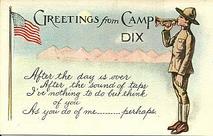 Image: NewJerseyAlmanac.com Image: NewJerseyAlmanac.com
-- World War I Woodrow Wilson's efforts to keep the nation out of the World War failed in the summer of 1917 when he asked for and received a Declaration of War against Germany from the Congress. Germany's decision to renew submarine attacks against Atlantic shipping, as well as disclosure of secret messages with Mexico over a potential alliance which could result in the return of former Mexican territory ceded to the US at the end of the Mexican-American War, generated public pressure for Wilson to reverse his position against entering the War. Republican Walter Edge, who had been elected New Jersey governor in the prior year running on a slogan of promoting more efficient government, "A Business Man with a Business Plan," became an enthusiastic supporter of Wilson's war mobilization programs, despite their previous differences when Wilson was governor and Edge was a leader of the Republicans in the state Senate. -- New Jersey mobilization Under Edge's leadership, sixteen camps for military training were established in the state, with the largest Camp Dix in Wrightstown and Camp Merritt in Tenafly. Camp Dix was formed after Edge consulted with federal officials in Washington and then assembled the land needed for the base through purchases from local property owners. Acting before the Congress authorized the spending, Edge ordered that state funds and construction crews be allocated to build paved roads to access camps like Dix located in previously rural areas. Camp Merritt became one of the principal staging areas for troops on their way back and forth from Europe through the port of Hoboken. Ships docking at Hoboken transported two million servicemen between the spring of 1917 and the fall of 1918; referring to the three potential fates facing his soldiers, General John "Black Jack" Pershing coined the slogan "Heaven, Hell, or Hoboken,” recognizing that nearly all surviving soldiers would come through Hoboken on their way home. The New Jersey National Guard was placed under federal control, and an estimated 150,000 to 200,000 men and women served in active military or naval service at home or abroad. In addition to the construction of roads to facilitate transport of troops and military equipment, the War also brought the expansion of the shipbuilding industry and the conversion of factories to military production. New Jersey munitions factories provided artillery shells and other ammunition used abroad, with estimates that about half of all US munitions produced during the War were made in the state. The termination of the importing of chemicals, much of which previously came from German suppliers, also contributed to the growth of the petrochemical industry in New Jersey, perhaps most notably in the establishment or expansion of drug manufacturers.
With increasing demands for workers to meet the needs of military production and European immigration curtailed during the War, New Jersey industries sent labor agents south to recruit African American workers. The recruitment effort continued following the War's end as the economy prospered during the decade of the 1920s. Between 1900 and 1930, the black population of the State nearly trebled, exceeding 208,000 in 1930 from the under 70,000 recorded in the 1900 census. 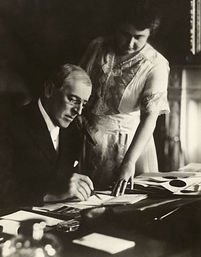 In the first posed photograph taken of Wilson after his stroke in October 1919, First Lady Edith Wilson steadies paper for his signature at the White House in June 1920. Image: Library of Congress In the first posed photograph taken of Wilson after his stroke in October 1919, First Lady Edith Wilson steadies paper for his signature at the White House in June 1920. Image: Library of Congress
-- End of the War
Hostilities in Europe ended in November 1918 when the Germans agreed to an armistice, and Wilson traveled to Paris to take part in the negotiations which led to the signing of the Treaty of Versailles in June 1919, which included Wilson's proposal to create a League of Nations to help reduce the potential for future wars. On his return to the US, Wilson set out on an extensive speaking tour to build public support for the Treaty's ratification by the Senate, but collapsed in Colorado and was rushed back to the White House, where he suffered a stroke in October 1919 leaving him partially paralyzed on his left side. His wife Edith and his doctor hid the severity of his condition from the public and the Congress, with the First Lady reportedly making decisions on his behalf and communicating them to outsiders as coming from her husband. The Treaty failed of ratification, and Wilson spent his remaining time in the White House slowly improving, but never fully recovering his strength. After the end of his second term in 1921, he and Mrs. Wilson purchased a home in Washington, where he died at the age of 67 in February 1924. |
|
-- Post-progressive politics
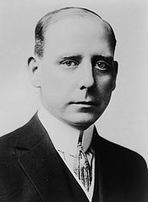 Frank Hague in 1920. Image: Library of Congress Frank Hague in 1920. Image: Library of Congress
With Woodrow Wilson in Washington, his reform agenda as governor to reduce the power of political bosses and implement electoral reforms was largely put aside. After losing his first race for the legislature running as a reformer against the Atlantic County Republican organization, the millionaire businessman Walter Edge had become a reliable member of the machine led by the flamboyant Enoch "Nucky" Johnson. Indeed, Edge's own election as governor in 1916 was reportedly aided by a perhaps unspoken arrangement between Johnson and Hudson County's Democratic boss Frank Hague through which Hague withheld active support from the Democratic gubernatorial nominee, Otto Wittpenn, who had been mayor of Jersey City until defeated by Hague in 1912. Hague’s control of Democratic majorities in Hudson County led to his growing influence in state and national politics. His ability to ensure heavy Democratic margins in Hudson to offset Republican turnouts in suburban and rural counties insured his role as one of the most powerful political bosses in the nation into the 1940s. -- the Roaring '20s
Although New Jersey's economy suffered a brief slump following the end of the War as production for military needs declined, the state soon entered a period of strong growth in the 1920s, only to be brought to an abrupt halt at the end of the decade. Mass distribution of electricity pioneered by Thomas Edison led to introduction of washing machines, refrigerators, electric irons, sewing machines and other household products which allowed more leisure time. Some of that time would be spent in activities offered like listening to the radio and the phonograph or going to the movies, all of which could be traced to the work in New Jersey of Edison and RCA Victor. Other innovations, such as condensed soup introduced by Campbell Soup, made food preparation faster and cheaper, as well as expanding markets to other regions of the country. For those with growing incomes, ownership of an automobile became a special goal. Henry Ford credited Thomas Edison as one of the few who gave him early encouragement and the men became close friends, regularly taking vacations together, sometimes joined by the tire magnate Harvey Firestone. In 1918, Ford constructed five buildings in Kearny, a plant which eventually had 8,000 workers producing more than 700 Model T cars daily until Ford sold the property in 1928 to the Western Electric Company and moved assembly operations to a new 38-acre plant in Edgewater on the Hudson River. In 1908, William Durant incorporated General Motors in New Jersey, taking advantage of the state's lax regulation of corporate trusts to pursue his plan of acquiring separate car companies under the ownership of a single holding company. In 1921, Durant, lost control of GM and founded his own company, Durant Motors, which set up operations at an assembly plant in Elizabeth originally built by the Duesenberg auto company--a plant considered one of most modern assembly plants in the country which by 1927 employed 1,000 workers making cars under Durant's name. Apart from the large national companies, New Jersey also became the site for more specialized firms producing vehicles or their parts. Two of the best-known manufacturers were the Mercer Automobile Company in Trenton making high-priced custom cars which was financed by the Roebling and Kuser families and Mack Trucks, which would continue building trucks in Plainfield at a plant established by a firm it acquired. By 1927, the state had over 100 firms employing more than 13,000 workers engaged in some segment of the motor vehicle industry. In addition to private investment, the 1920s in New Jersey also saw a rapid development of public projects, many of them intended to serve growing demands in transportation. In 1921, the Port of New York Authority was created to improve management and coordination of the system of bridges, highways, subways, and port facilities, which during World War I had often been congested in supporting the war effort. In 1926, the Benjamin Franklin Bridge to Philadelphia was completed and over the remaining years of the 1920s the Holland Tunnel opened to traffic, construction began on the George Washington Bridge and flights began at Newark Airport, the first airport with paved runways in the nation. -- Prohibition
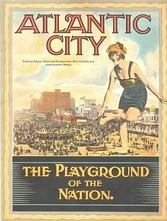 Image: NewJerseyAlmanac.com Image: NewJerseyAlmanac.com
Throughout the 1920s, a continuing political issue was prohibition, which in New Jersey generally contrasted the anti-prohibition Democrats with their base of support among immigrant families in the cities, with the Republicans, who counted on wider geographical coverage in more rural areas outside the cities. On October 29, 1919, the Congress overrode President Wilson's veto of legislation, commonly called the Volstead Act, implementing the 18th Amendment which prohibited the manufacture, sale and transport of "intoxicating liquors." In New Jersey, the 1919 gubernatorial campaign had focused on the alcohol issue to the extent that the anti-prohibition platform advanced by Democrat Edward Edwards became known as "the Applejack campaign." Following Edwards's victory, the Volstead Act went into effect at the same time he was sworn into office as governor in January 1920.
Despite the federal legislation, the new policy, aided by a governor openly hostile to its intent, was largely ignored in much of the state. Indeed, Atlantic County became one of the nation's leading entry points for illegal alcohol as its Republican boss Nucky Johnson protected offshore boats bringing bootlegged cargo from Canada, with Johnson exacting a hefty fee on each barrel. “We have whisky, wine, women and slot machines,” Johnson was quoted as confessing. “I won't deny it and I won't apologize for it. If the majority of the people didn't want them they wouldn't be profitable and they would not exist. The fact that they do exist proves to me that the people want them." Other mobsters such as Abner "Longy" Zwillman, Dutch Schultz and Richie "the Boot" Boiardo made large sums from exploiting the demand for liquor, wine and beer. In 1929, Johnson's prominent role in the national criminal network was demonstrated by his hosting of the "Atlantic City Conference" attended by several of the leading gang bosses in the country, including Al Capone, Meyer Lansky and Lucky Luciano. Among topics reportedly discussed at the meeting was planning for the eventual repeal of prohibition (which took place in late 1933) by expanding their operations in gambling and prostitution. * Woodrow Wilson, Miller Center, University of Virginia
* Woodrow Wilson Presidential Library and Museum * Woodrow Wilson Papers, Library of Congress * Wilson by A. Scott Berg (2014) * Woodrow Wilson: A Biography by John Milton Cooper Jr. (2011) * A Jerseyman's Journal: Fifty Years of American Business and Politics by Walter Edge (1948) * Native Americans * Exploration and Settlement * British colony
* Royal governance * Path to Revolution * Revolutionary War * Industrialization * Civil War * Post-War Economy & Reform * Woodrow Wilson as Governor * World War I & 1920s * Great Depression * World War II * Post-War Development * 1960s & Richard Hughes * 1970s & Income tax * 1990s-Whitman & Florio * 9/11 & McGreevey Administration * Codey & Corzine * Chris Christie * Phil Murphy |

